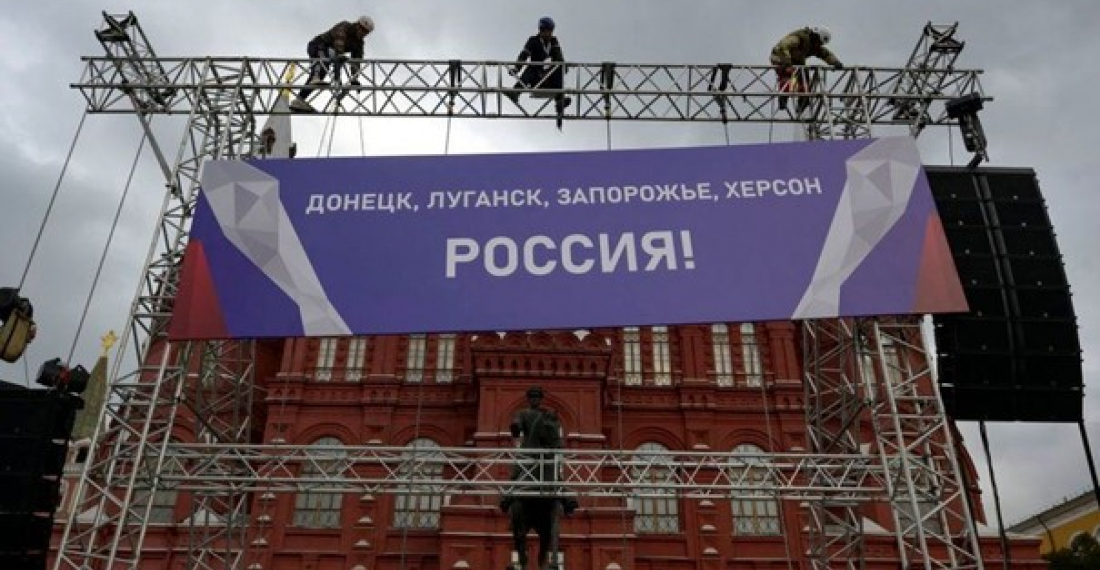Friday, 30 September 2022 will for a long time be remembered as a sad and dark day for Europe. This afternoon, at 15:00 (12:00 GMT) in the St George Hall of the Grand Kremlin Palace president Vladimir Putin will hold a signing ceremony annexing four more regions of Ukraine into the Russian Federation.
The events in Europe in the 1930 are repeating themselves with an eerie familiarity: a big country invades a smaller neighbouring country, organises a sham referendum in parts or all of that country, after which it claims the moral authority to annex that territory or country.
In an act of cynicism late on Thursday, the Russian president signed two decrees recognising Zaporizhzhia and Kherson as independent territories. Their so called independence will last for only a few hours, before they are absorbed into Russia. The documents, shared on Russian state media, say the independence of the two regions is being recognised in accordance with international law and "enshrined in the Charter of the United Nations". However, UN Secretary General António Guterres has said any annexation of a country's territory based on the use of force violates the UN Charter and international law.
Europeans thought that those times were over, and that the lessons had been learnt. Apparently not. Russia's invasion of Ukraine last February set the stage for what will take place in the Kremlin today. After votes in Luhansk and Donetsk in the east of Ukraine, and in Zaporizhzhia and Kherson in the south, Russia will annexe them, in defiance of the wish of the Ukrainian people and their legitimate government, and of most of the international community. It has already acted in this way once, when in 2014, in similar circumstances it occupiued and annexed Crimea.
Today's events are being hailed as a victiory by the Kremlin. A stage has already been set up in Moscow's Red Square, with billboards proclaiming the four regions as part of Russia and a concert planned for the evening in celebration. Some Russians may decide to follow the misguided steps of their leaders, but for the rest of Europe today is a sad and dark day.
Sharp reaction in Europe, but in other parts of the world the significance of Russia's actions are yet to be fully understood.
Ukrainian President Volodymyr Zelensky said the "pseudo-referendums" were worthless and did not change reality. "The territorial integrity of Ukraine will be restored. And our reaction to recognition of the results by Russia will be very harsh."
"The United States, I want to be very clear about this, will never, never, never recognise Russia's claims on Ukraine sovereign territory," US President Joe Biden said on Thursday..
In a phone call with Mr Putin, Turkey's President Recep Tayyip Erdogan also expressed his opposition to the plan. He called on the Russian leader to reduce tension and give peace negotiations with Ukraine another chance, according to a spokesperson.
Europe stands united as never before in the face of Russian aggression. Even countries that have historically been neutral have now joined in facing up to the Russian aggression. Sweden and Finland abandoned their long policy of neutrality and are poised to join NATO; Switzerland, for a long time a neutral country, has joined the tough sanctions against Russia.
But how about the Global South? Here the situation is different and many countries have decided to stay on the fence and let the crisis in Ukraine play out. They are wrong. Countries like India, a champion of the rights of small countries, need to stand up and be counted on the right side of history. Similarly many countries in the Middle East and Africa, Asia and Latin America. To see what is happening in Europe today from old cold-war prisms is absolutely wrong. This is not an ideological conflict. It is a conflict of good versus evil, and here everyone needs to make the right decision.
And how about China? For China this is an uncomfortable situation. They would have preferred not to be made to choose. For geo-strategic reasons China wants to remain close to Russia, but Putin's evil is starting to rub off on China, and that worries Beijing. In the current situation China can be a game-changer, but will it. Time will tell and history will judge.
source: This is an editorial prepared by the editorial team of commonspace.eu
photo: A stage being set up on Moscow's Red Square to celebrate the annexation of parts of Ukraine in the Russian Federation. For the rest of Europe this is a sad and dark day.






